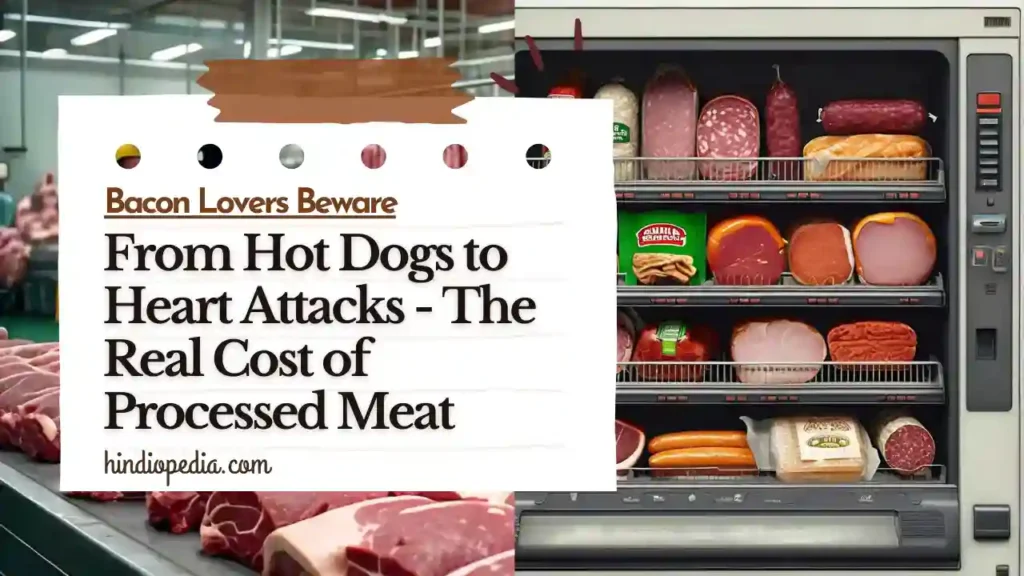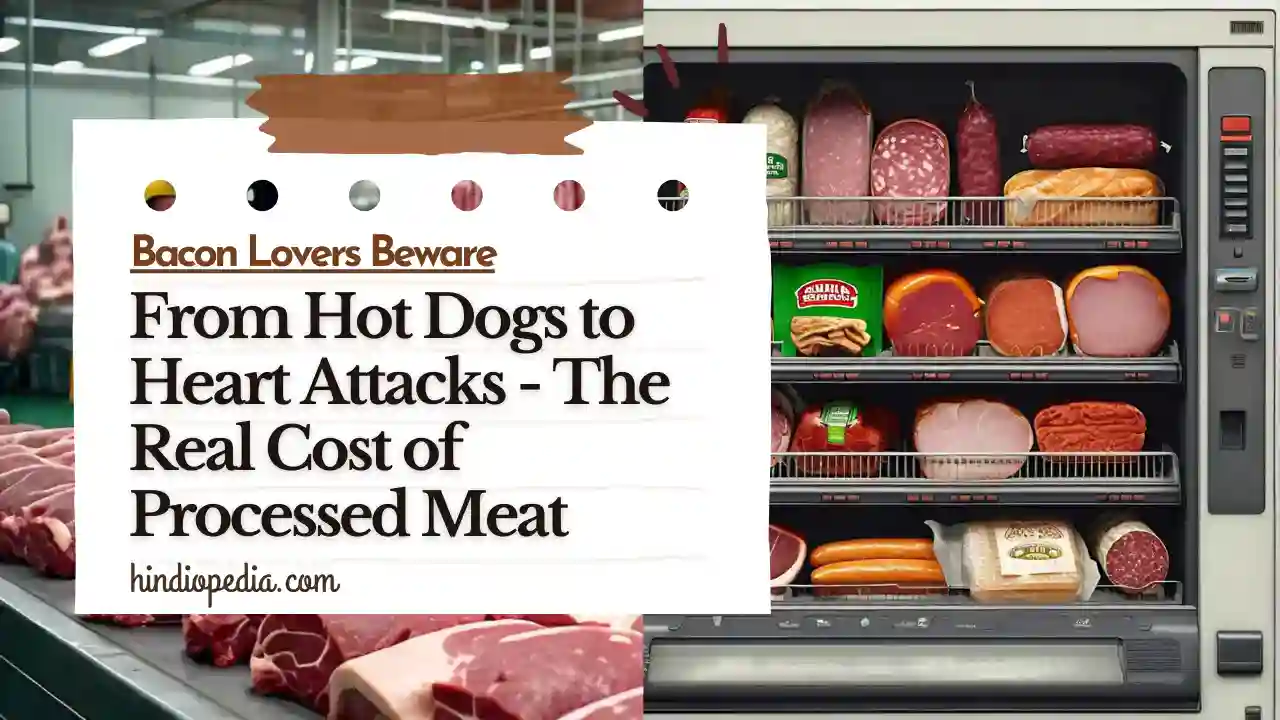The Hidden Dangers of Processed Meat | The Silent Killer in Your Sandwich?
Processed meat is a staple in many diets. It’s convenient. It’s tasty. But it’s not without risks. This article will explore the hidden dangers of processed meat. We’ll uncover what you need to know to make informed choices.

What is Processed Meat?
Processed meat isn’t fresh meat. It’s meat that’s been modified. This modification enhances flavor. It also extends shelf life. Common processing methods include:
- Curing
- Smoking
- Salting
- Adding preservatives
Examples of processed meats include:
- Bacon
- Hot dogs
- Salami
- Pepperoni
- Deli meats
- Canned meats
The processing changes the meat’s composition. It adds ingredients. These changes can impact health.
Health Risks Associated with Processed Meat
Numerous studies link processed meat to health issues. Let’s examine the major concerns:
#1 Cancer Risk
The World Health Organization (WHO) classifies processed meat as a Group 1 carcinogen. This means it’s known to cause cancer. The risk is most significant for colorectal cancer.
A study in the International Journal of Cancer found:
- Consuming 50g of processed meat daily increases colorectal cancer risk by 18%
- This is equivalent to about 4 strips of bacon or 1 hot dog
The cancer risk isn’t limited to colorectal cancer. Processed meat consumption has been linked to:
- Stomach cancer
- Pancreatic cancer
- Prostate cancer
#2 Heart Disease
Processed meats are often high in saturated fat. They’re also high in sodium. Both factors contribute to heart disease risk.
A study in the journal Circulation reported:
- Each 50g daily serving of processed meat increased heart disease risk by 42%
- It also increased diabetes risk by 19%
#3 High Blood Pressure
The high sodium content in processed meats is a concern. It can lead to high blood pressure. This condition is a major risk factor for heart disease and stroke.
The American Heart Association recommends:
- No more than 2,300 mg of sodium per day
- Ideally, limit intake to 1,500 mg per day
A single serving of some processed meats can contain over 500 mg of sodium.
#4 Obesity
Processed meats are often calorie-dense. They’re high in fat. This can contribute to weight gain and obesity.
A study in the New England Journal of Medicine found:
- Processed meats were among the foods most strongly associated with weight gain
#5 Type 2 Diabetes
Regular consumption of processed meats may increase diabetes risk. A meta-analysis in Diabetologia showed:
- Each 50g daily serving of processed meat increased diabetes risk by 32%
Why are Processed Meats Harmful?
Several factors contribute to the health risks:
1. Nitrates and Nitrites
These preservatives can form nitrosamines. Nitrosamines are carcinogenic compounds. They form during high-heat cooking. They also form in the body.
2. Sodium
High sodium intake is linked to hypertension. It’s also linked to cardiovascular disease.
3. Saturated Fat
Excessive saturated fat can raise cholesterol levels. This increases heart disease risk.
4. Advanced Glycation End Products (AGEs)
These compounds form when meat is cooked at high temperatures. They’re linked to inflammation and oxidative stress.
5. Polycyclic Aromatic Hydrocarbons (PAHs)
These carcinogenic compounds form during smoking processes.
6. Heterocyclic Amines (HCAs)
These carcinogenic compounds form when meat is cooked at high temperatures.
| Compound | Source | Health Risk |
|---|---|---|
| Nitrosamines | Nitrates/Nitrites | Cancer |
| Sodium | Added for flavor/preservation | Hypertension, Heart Disease |
| Saturated Fat | Natural in meat, enhanced in processing | Heart Disease |
| AGEs | High-temperature cooking | Inflammation, Oxidative Stress |
| PAHs | Smoking process | Cancer |
| HCAs | High-temperature cooking | Cancer |
Alternatives to Processed Meat
Reducing processed meat intake can be beneficial. Here are some healthier alternatives:
- Fresh, unprocessed meats
- Plant-based proteins (beans, lentils, tofu)
- Fish and seafood
- Eggs
- Nuts and seeds
These options provide protein without the added risks.
How to Reduce Processed Meat Consumption
Cutting back on processed meat doesn’t have to be difficult. Try these strategies:
- Read labels carefully
- Choose fresh meats over processed ones
- Experiment with plant-based meals
- Use herbs and spices for flavor instead of processed meats
- Prepare meals at home more often
The Bottom Line
Processed meats pose several health risks. These risks include cancer, heart disease, and diabetes. The dangers stem from various compounds. These compounds are either added or formed during processing.
References
- World Health Organization. (2015). IARC Monographs evaluate consumption of red meat and processed meat.
- Cross, A. J., et al. (2010). A large prospective study of meat consumption and colorectal cancer risk: an investigation of potential mechanisms underlying this association. Cancer Research, 70(6), 2406-2414.
- Micha, R., et al. (2010). Red and processed meat consumption and risk of incident coronary heart disease, stroke, and diabetes mellitus: a systematic review and meta-analysis. Circulation, 121(21), 2271-2283.
- Mozaffarian, D., et al. (2011). Changes in diet and lifestyle and long-term weight gain in women and men. New England Journal of Medicine, 364(25), 2392-2404.
- Feskens, E. J., et al. (2013). Meat consumption, diabetes, and its complications. Current Diabetes Reports, 13(2), 298-306.
- American Heart Association. (2021). How much sodium should I eat per day?
- American Institute for Cancer Research. (2021). Processed meat and cancer risk.





